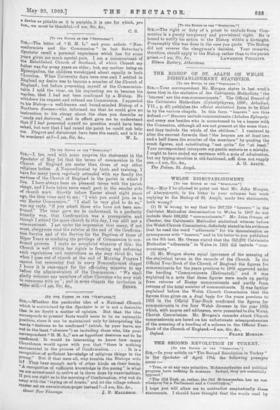[To TM< EDITOR Or TN! "SPRCTATOR."
too, read with some surprise the statement in the Spectator of May 1st that the terms of communion in the Church of England are easier than those of any other religious bodies. A Nonconformist by birth and training, I have for many years regularly attended with my family the services of the Church of England in the parish in which I live. I have always been on pleasant terms with the parish clergy, and I liave taken some small part in the secular Side of church work. Shortly before Easter about eight years ago, the then vicar said to me : "I wish you could join us in our Easter Communion." "I shall be very glad to do so," was my reply, "if you admit those who have not been con- firmed." The vicar gave me to understand, in a perfectly friendly way, that Confirmation was a prerequisite, and though I attend the same church to this day, I am AM not a communicant. I am tinder the impression that many, if not most, clergymen read the rubrics at the end of the Confirma- tion Service and of the Service for the Baptism of those of Riper Years as confining the privilege of Communion to con- firmed persons. I make no complaint whatever of this : the Church. is well within her rights in framing and enforcing such regulations and restrictions as she may think fit; but When I pass out of church et the end of Morning Prayers I cannot but remember that in every NonconforMist phenol I know it is customary for the officiating minister to say before the administration of the Communion " We shall gladly welcome any members of other Churches who may wish to commune with ps " ; and in some chapels the invitation is
Wider still.—I am, Sir, &o., Spam.






































 Previous page
Previous page